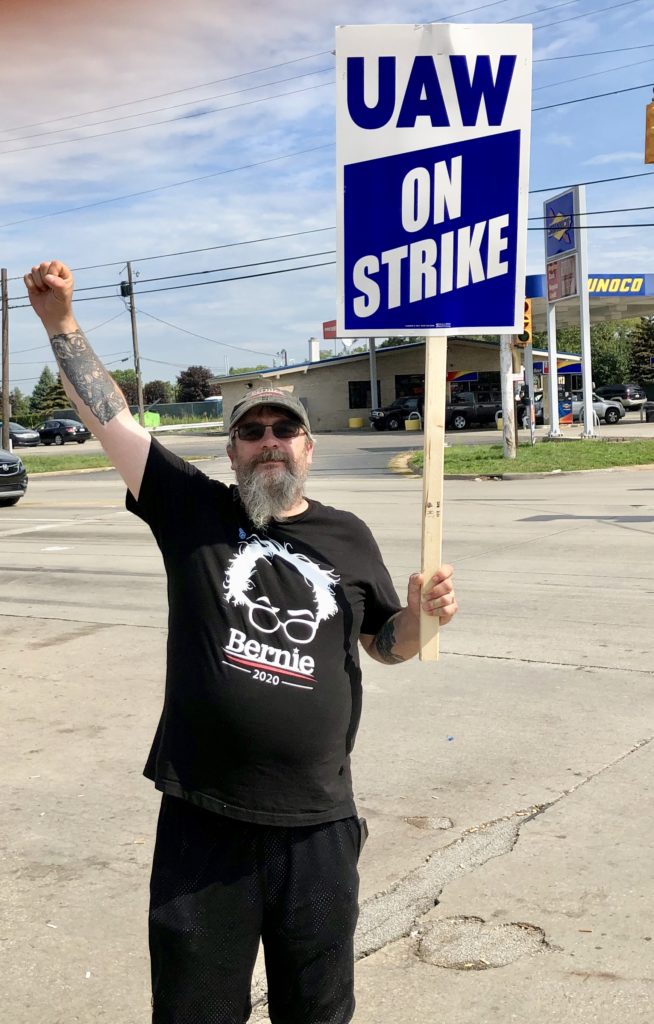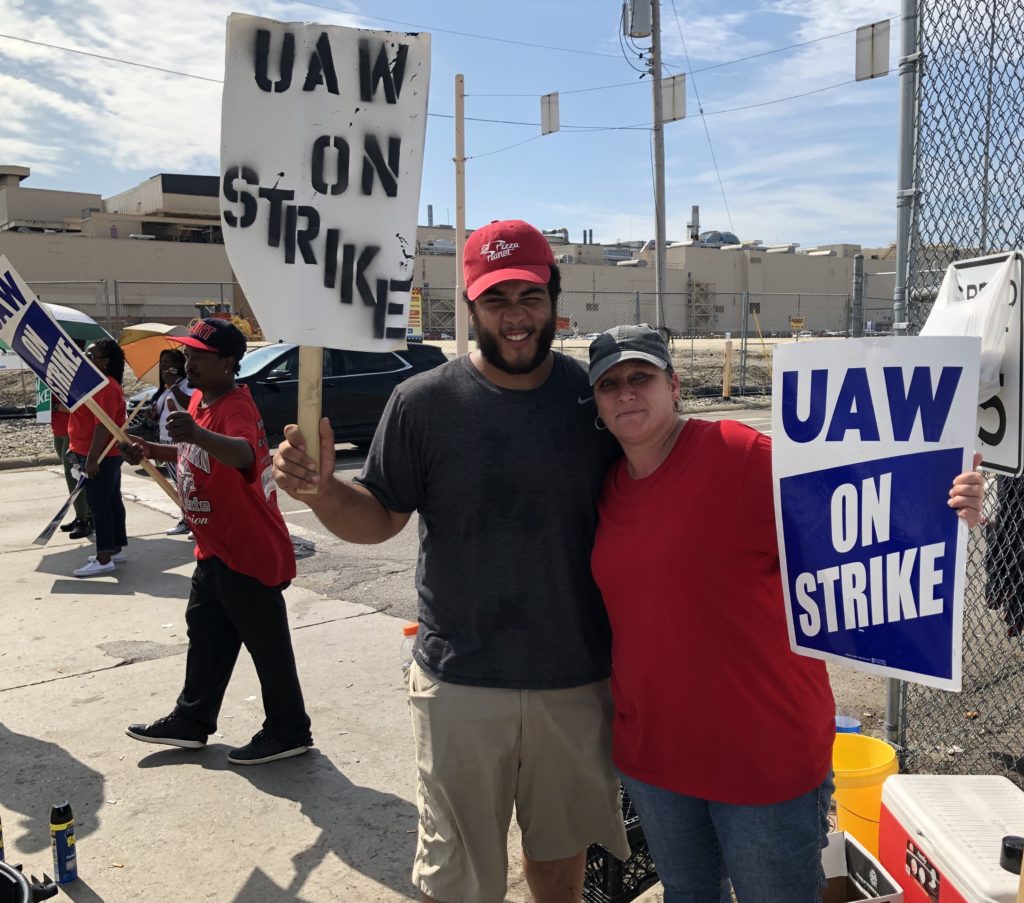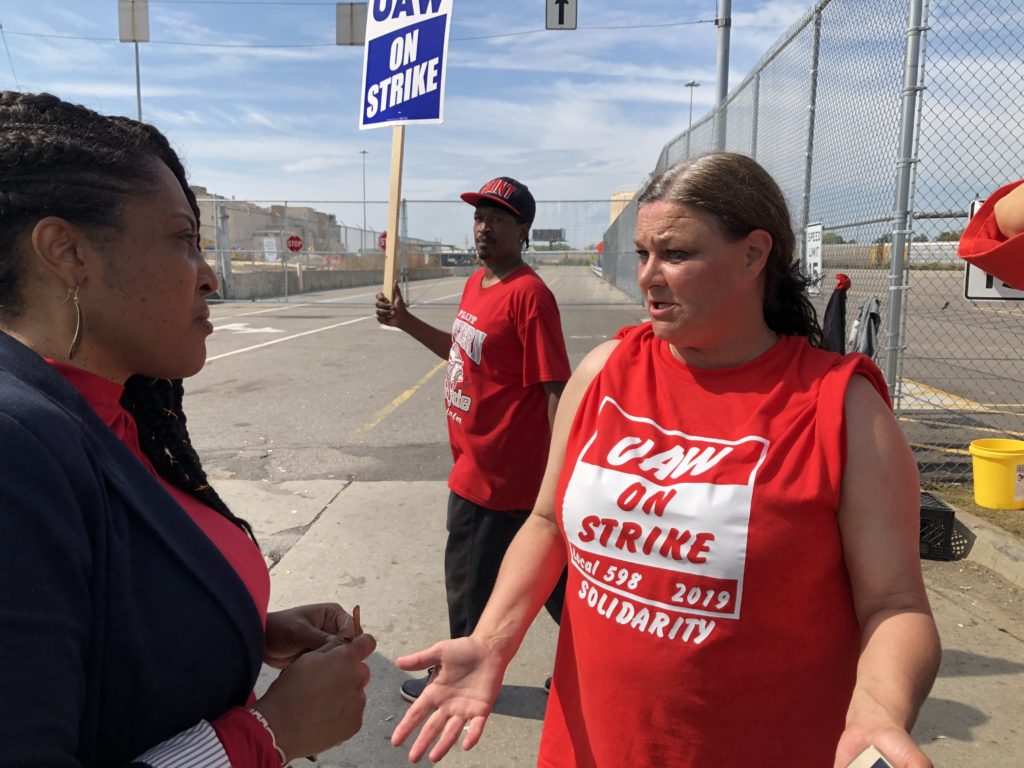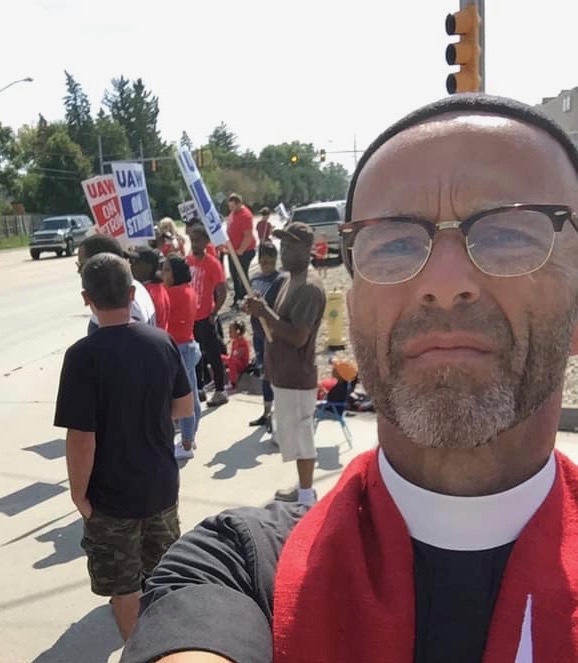By Jan Worth-Nelson
Amidst continual honks from passersby in bright sun, United Auto Workers strikers on the picket line at the General Motors Flint Assembly Plant on Van Slyke Road said Friday they have “no clue” how long they’ll be there and are worried, but also committed to what they hope will be greater parity on two matters: the status of temporary workers and threatened cuts to health care benefits.

Fred Richey on the picket line Friday “I’m pretty sure Bernie’s supporting all the workers,” Richey said. (Photo by Jan Worth-Nelson)
Some also said in light of the corporation’s recent profits, they would like a share.
The strike hit its seventh day Sunday. An estimated 48,000 GM and workers from allied suppliers are affected as their union leaders confab over a new four-year contract at the Renaissance Center in Detroit.
In his letter announcing the strike to General Motors Labor Relations Vice President Scott Sandefur Sept. 15, Terry Dittes, vice president and director of UAW GM department, asserted union officials had met with GM representative “countless times” but criticized the company for waiting until “just two hours before the contract expired to make what we gard as its first serious offer.”
Dittes said topics on the table were “many,” including “wage increases, wage progression for new hires, health care and prescription drug benefits, skilled trade issues jobs security, profit-sharing, and the treatment of temporary employees.”
Clad in a Bernie teeshirt, Flint Assembly trim line worker Fred Richey said he came out “in solidarity with all my union brothers and sisters — and all unionized workers and all non-unionized workers.”
Richey said he hired in as a full-timer in 2002 but is concerned about better treatment for temporary workers and potential cuts to health care. “I know people who’ve came in four or five years ago as temps and they’re still temps,” he lamented.
Kristine Momany is a UAW member from Aramark, the contract company providing janitorial services–experiencing her first strike.
Specifically, she is a “booth cleaner” for the booths where trucks are painted. “The stuff that we’re doing could kill us,” Momany said. “We have to make sure the carriers are clean, the booths are clean, we touch every machine that touches the the trucks, and we have to make sure everything is clean and ready to run.”
She’s been full-time at Aramark for nine years. “We had to wait a whole year to get a contract,” she said. “We’re the little ones –they’re not doing nothing for us,” she said.
Asked how long she thinks the strike might last, Momany said, “I don’t know. I’m scared, but I’m excited because we’re coming together — we’re all helping each other.
“Everybody depends on us,” she said, “We’re out here for our families, and our union families. I might not know her,” she said–pointing to another picketer, “but she’s my union sister.”

Kory Momany and his mother Kristine Momany, both Aramark employees (Photo by Jan Worth-Nelson)
Also on the picket line was Kory Momany, Kristine’s son, who is a blaster for Aramark — “He only makes 23 cents more than somebody who cleans a toilet,” his mother said,”and it’s dangerous work. He’s got a small son and a life.”
Kory Momany said when he’s not on the picket line, he’s at another job, helping a relative build houses. He can’t handle being out of work, he said.
“We’re going to be out here as long as we have to, but hopefully not too long,” his mother said.
“We need better health care, we want some profit-sharing.” Pointing to the factory stretching out behind her, she said, “We’re a part of this.”

UAW member Tammy Sullivan talking to Pamela Pugh, Flint Mayor Weaver’s chief health advisor (Photo by Jan Worth-Nelson)
Kaneisha Torrence, Dorrit Madison and Alanda Sims–all UAW, but representing full-time, Aramark and temp worker respectively, said, “We’re just hoping things will change. The issues have to be resolved.”
About then the picketers were joined by Flint Mayor Karen Weaver, who arrived with Dr. Pamela Pugh, the mayor’s chief public health advisor.
As the picketers gathered round to tell their stories to the mayor, she said, “We’re fighting for resources for the people who have built this city.
“People are suffering — it’s getting worse, children that are suffering daily — adults, our seniors can’t get their medication. This is unacceptable — we need a fair contract now,” Weaver said.
“Absolutely,” UAW picketer Tammy Sullivan, another Aramark employee, agreed. “Flint has suffered enough–enough with the corporate greed.”
“This is Ground Zero,” Weaver replied. “This just shouldn’t be going on. We shouldn’t have to do this to get decent pay and health care.”
Weaver said she brought Pugh along to hear directly from the strikers about their health challenges and needs.
Asked if she had power over GM, Weaver replied, “I don’t know–but remember during the emergency manager time, I used my voice and it worked.
“I may not have power, but I have my voice, and they know my positions,” she said. Asked if she could get through to people at the top, both at the union and at General Motors, she said, “Yes. We want a seat at the table. We’ve had conversations. They take my calls.”
“The more of us that are speaking on all this, the more powerful it becomes,” she told the picketers. ” We’ve already had a public health crisis in the city with the water, and now you compound it with this — that’s not good.”
One Flint resident who has joined the strikers on the picket line every day so far is Pastor Dan Scheid, rector of St. Paul’s Episcopal Church in downtown Flint.
“Economic justice for workers is Biblical justice,” he said. “My theology is that God stands on the side of the oppressed, so that’s where I choose to stand. I’m fortunate to be rector of St. Paul’s–a parish that understands this.”
Also, he noted, “Many St. Paul’s parishioners are GM retirees, and some are descendants of Sit Downers, so I picket in their honor.”

Pastor Dan Scheid at the picket line, Sunday Sept. 22 (Photo by Dan Scheid)
Banner image: Mayor Karen Weaver meets with strikers at the corner of Van Slyke and Atherton, Friday, Sept. 20 (Photo by Jan Worth-Nelson)
EVM Editor Jan Worth-Nelson can be reached at janworth1118@gmail.com.


You must be logged in to post a comment.